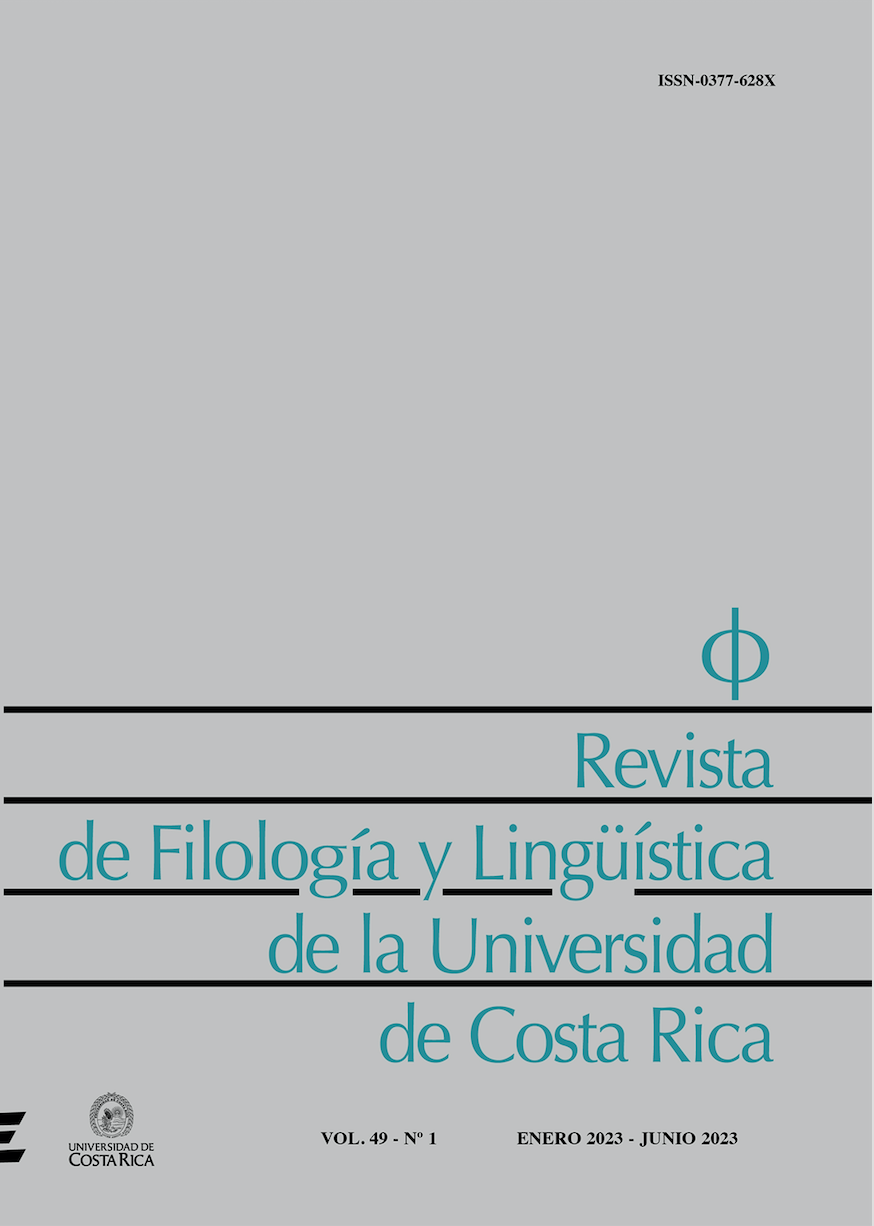Abstract
This article reads the novel “Nadie me verá llorar” from the perspective of the relations between the language of madness and the language of sanity, and at the same time, the relations between the text, the subject, and the reader. In order to do this, I start by addressing the issue of madness as an absence or, an abundance of language, then, I look at the presence of pathos as a possibility of the existence of madness, and finally, I analyze the relationship between the reader and the text based on what I previously problematized. The notion of madness that I subscribe to for this analysis is the one proposed by Foucault (1972) in History of Madness, pointing out that it must be understood as a historical, cultural, and social construction since it is in constant transformation. Therefore, madness has a fickle character, which makes it impossible to fix.
References
Barthes, R. (1984). La mort de l’auteur. En Le Bruissement de la langue. Essais critiques IV (pp. 63-69). Éditions du Seuil.
Borges, J. L. (1986). Ficciones; El Aleph; El informe de Brodie. Fundación Biblioteca Ayacuch.
Castel, R. (2009). El orden psiquiátrico. La edad de oro del alienismo. Buenos Aires: Nueva Visión.
Calligaris, C. (1991). Clínica Diferencial de las Psicosis. Ediciones Nueva Visión.
Cavazos, M. (2011). Trastornos de género: Identidad y Fronteras en la narrativa de Cristina Rivera Garza. [Tesis de doctorado]. University of Texas at Austin. https://repositories.lib.utexas.edu/bitstream/handle/2152/ETD-UT-2011-08-4397/CAVAZOS-DISSERTATION.pdf?sequence=1&isAllowed=y
Derrida, J. (1967). Cogito et histoire de la Folie, in L’Écriture et la Différence (pp. 51-98). Éditions du Deuil.
Díaz, E. (2005). La filosofía de Michel Foucault. Editorial Biblos.
Felman, S. (1978). La folie et la chose littéraire. Éditions du Seuil.
Foucault, M. (1972). Histoire de la folie à l`âge classique. Editions Gallimard.
Foucault, M. (2003). Le pouvoir psychiatrique. Cours au Collège de France 1973-1974. Seuil Gallimard.
Fortanet, J. (2008). En torno a la “Historia de la locura” ; la polémica Foucault- Derrida”. Revista Observaciones filosóficas, (6), 8. https://www.observacionesfilosoficas.net/entornoalahistoria.html
Freud, S. (1990). Estudios sobre la histeria (1893-1895), Obras completas (Vol. II). Amorrortu.
Gros, F. (2000). Foucault y la locura. Ediciones Nueva Visión.
Hounie, A. (2013). La construcción de saber en la clínica. [tesis de doctorado]. Universidad Complutense de Madrid.
Lacan, J. (1999). Propos sur la causalité psychique. En Écrits I (pp. 150-192). Éditions du Seuil.
Macías, C. (2006). Nadie me verá llorar: Huellas de la historia en la ficción. Revista Iberoamericana, 17, 193-213. https://s-space.snu.ac.kr/bitstream/10371/69325/3/3549182001.pdf
Palaversich, D. (2005a). El vértigo esquizofrénico y la narrativa de Diamela Eltit. En De Macondo a McOndo: senderos de la postmodernidad latinoamericana (pp. 87-100). Plaza y Valdés Editores.
Palaversich, D. (2005b). Cristina Rivera Garza y Patricia Laurent Kullick en las orillas de la historia y la locura. En De Macondo a McOndo: senderos de la postmodernidad latinoamericana (101- 120). Plaza y Valdés Editores.
Park, J. (2013). Manicomio y locura: revolución dentro de la Revolución Mexicana en Nadie me verá llorar de Cristina Rivera Garza. Anclajes, 17(1), 55-72. https://dialnet.unirioja.es/servlet/articulo?codigo=4399341
Rivera Garza, C. (2013). Nadie me verá llorar. Tusquets Editores.
Rivera Garza, C. (2005). Bibliotecas como catedrales como bibliotecas: el personaje y el documento en Nadie me verá llorar. En M. Rivera y S. López (Eds.), Memoria del XI Coloquio Internacional de bibliotecarios. La calidad de los sistemas de información al servicio de la sociedad (pp. 217-220). Universidad de Guadalajara.
Spivak, G. C. (1988). Can the subaltern Speak. En C. Nelson y L. Gross-berg (Eds.), Marxism and the interpretation of Cultura. University of Illinois Press.
Spivak, G. C. y Giraldo, S. (2003). ¿Puede hablar el subalterno? Revista Colombiana de Antropología, 39, 297-364
Vásquez Ávila, M. (2011). La locura en el campo del lenguaje : reflexiones sobre el delirio. En S. Rodríguez Márquez (Ed.), Trabajos del psicoanálisis (pp. 37-60). Editorial Fontamara.


